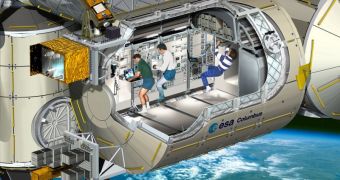Columbus is the European module for the International Space Station to be launched aboard Atlantis this year and is a science laboratory designed to be a part of the International Space Station (ISS). Named after the famous explorer, the 12.8 tonne is now completely outfitted and ready to enter Atlantis' payload bay.
"The launch of Columbus will be a major landmark in European space exploration," said Bernardo Patti, Columbus Project Manager. "Columbus was originally scheduled for launch in 2002, but delays in the construction of the ISS and the tragic loss of Shuttle Columbia have put back the mission five years."
This is the biggest single contribution to the ISS made by the European Space Agency (ESA), through the primary contractor EADS Astrium Space Transportation and it's designed for ten years of continuous operation.
"Once Columbus is operational, we will have a permanent presence on the Station. We will own our own real estate. By providing the Automated Transfer Vehicle and Columbus, ESA will be able to meet its scientific objectives as a full partner, sharing resources with other ISS participants rather than simply purchasing them."
Set for December 6, 2007, the launch now undergoes the final check and will soon be placed inside a canister 4.5 meters in diameter for transport to the launch pad. The last tests will check the integrity of vital systems, like the water cooling system, all the electrical systems and the pressurization mechanisms.
Columbus is 6.871 meter long, has a diameter of 4.487 meters and has a launch mass of 12,800 kilograms, of which 2,500 kilograms represent the payload, consisting of ten active International Standard Payload Racks (ISPRs) for scientific purposes.
Atlantis Space Shuttle is also undergoing the last preparations for the next missions, as NASA is particularly sensitive about damage inspections after the Columbia disaster and the freak hail storm that did extensive damage to the shuttle's tank and its insulation foam, before the most recent mission.

 14 DAY TRIAL //
14 DAY TRIAL //